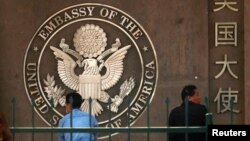The administration of President Joe Biden has proposed increasing the cost of almost all nonimmigrant visas.
U.S. officials say the price increase is needed to balance the cost of visa services. But critics say, if the wait times for the documents are not shortened, increased visa costs could mean fewer travelers and students coming to the United States.
The Federal Register, the official journal publication of the U.S. government, published the proposal in late December. It said the State Department expects the new prices to go into effect by September. The State Department is accepting comments on the proposed increases until February 28.
David Bier is an immigration policy expert at the Cato Institute, a research group in Washington, D.C. Bier told VOA: “All of the fee increases are happening at a time when tourism and travel to the United States is already at an all-time low, and the State Department is imposing waits of six months to a year in many places for a tourist- or business-travel visa.”
State Department information shows that the most popular visas are for tourism, business and study.
A nonimmigrant visa permits the holder to travel as a tourist or live, work or study temporarily in the U.S. under defined conditions. B1 and B2 visas are for business and tourism. Visas F, M, and J are student visas. Their price is increasing from $160 to $245, a 54 percent increase. Visas H, L, O, P, Q, and R are for employment. Their price is increasing from $190 to $310, a 63 percent increase.
Bier said that the most important thing is that the visas are given quickly. He said, if the State Department increases the cost, but does not improve service, the result will be fewer travelers to the U.S.
Longer waits
On Biden’s first day in office, he presented the U.S. Citizenship Act of 2021. The bill would have called for big changes in immigration policy. But, Congress has not acted on the legislation.
Some immigration experts say Biden overturned many of former President Trump’s immigration policies. These experts say an executive order from Trump is responsible for creating longer wait times.
In addition, the State Department suspended usual visa services at all U.S. embassies and consulates in 2020 because of the COVID-19 health crisis. Restrictions related to the new coronavirus have added to longer wait times. The Cato Institute said that the State Department will slowly bring back visa service, but about a fourth of offices are partly or fully closed.
Bier said in January most consulates reported waits of 202 days for a visa appointment for business travelers or tourists. In April 2021, the usual wait was 95 days. For students and exchange visitors, the wait was about 38 days. That is up from 25 days a year ago. Waits for appointments for most other visas, including skilled and temporary workers, is 62 days. That is up from 40 days in April 2020.
Effect on students, workers
A State Department spokesperson explained that consular operations are supported by the visa fees. The proposed fee increase is to make sure the agency is recovering the costs for providing its services.
Jill Welch is a policy adviser to the Presidents’ Alliance on Higher Education and Immigration. Welch said the increased costs need to result in better service, especially shorter wait times. That is important for students who need to enter the U.S. in time for school. The group is still considering how the new policy will affect international students.
I’m Gregory Stachel.
Aline Barros reported this story for Voice of America. Gregory Stachel adapted it for VOA Learning English.
_________________________________________________________________
Words in This Story
fee – n. an amount of money that must be paid for a good or service often in addition to the price
tourism – n. the activity of traveling to a place for pleasure
impose – v. to cause (something, such as a tax, fine, rule, or punishment) to affect someone or something by using your authority
consulate – n. the building where a consul lives and works
unfortunate – adj. not appropriate or desirable
We want to hear from you. Write to us in the Comments section, and visit our Facebook page.





